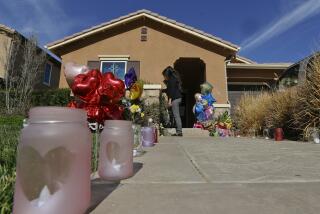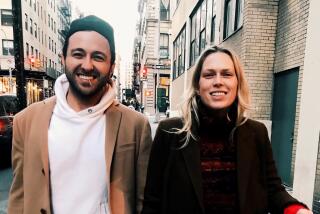She’s Been Called Mom by 270 Foster Children
- Share via
Mom.
That is a word 7-year-old Jacob will never be able to say.
He was born with a genetic condition that damaged his vocal cords, caused his forehead to be twice the size of a normal child’s, shrank all his fingers to the size of a pinky, distended his belly and deformed his feet.
But the condition has not stopped him from playing with other children, going to school or hugging his foster mother, Sally Freeman.
Every year, especially around Mother’s Day, officials with the Los Angeles County Department of Children and Family Services are reminded of the great need for mothers like Freeman, who cares for children like Jacob, his three foster brothers, Manny, 4, Kenny, almost 2, and Danny, 1, and about 270 others who have called her Mom at some point in their troubled lives.
“When [Jacob] first came here as a few-months-old baby, he looked like a little monster and would not stop crying,” said Freeman, 62. “I held him in my arms and he stopped crying. He was not a monster anymore.”
The county steps in and takes custody of children who are hurt, neglected or abandoned by those who are supposed to love them the most. In Los Angeles County, about 47,600 children are now in the foster care system, county officials said.
Nearly half of these children stay with relatives, about 30% live in foster homes and the rest live in group settings because they require closer supervision, county officials said. The county pays foster parents between $380 and $540 per child per month, depending on the age of the child.
Despite the demand, the number of foster homes has remained steady, at 8,000, in the past few years, said county department administrator Xavier Rosales.
The county loses bed spaces when foster parents adopt some of the children they take in and reach the limit of children their household can accommodate, he said. In the last two years, the number of foster children who were adopted has risen 65%.
“It’s great for the children because that’s our ultimate goal, to find them permanent homes,” Rosales said. “But at the same time, we do not see a lot more foster parents signing in.”
The same is true at the national level. Between 1986 and 1996, the number of children in foster care jumped 90% while the number of foster families fell by 3%, according to the latest numbers from the National Foster Parent Assn.
“We could always use more space, more caring parents,” Rosales said. “All these children need are some words of encouragement, a home where they can feel safe and loved.”
Children like Jacob need extra-special care.
From birth, Jacob had it tough. Not only was he abandoned by his biological mother, he was born with trisomy, a chromosomal disorder that causes physical deformities and delays mental growth.
“Jacob was supposed to die,” Freeman said. “He looked so bad that doctors did not expect him to live beyond 1 year old. Look at him now,” she said, gesturing toward Jacob as he returned home from school at Lokrantz Special Education Center in Reseda.
Freeman’s husband, Jerry, greeted Jacob, picked him up and sat him on his lap.
“He is Daddy’s boy,” said Jerry Freeman, 66, almost whispering. “Yes, he is.”
A few days earlier Jacob had undergone surgery--his eighth--this time to repair a hernia.
Jacob can walk slowly but cannot take care of his basic needs. He must be fed, showered, diapered and dressed, and he cannot speak.
When he was born, a Southern California couple were planning to adopt him, Sally Freeman said. But when the couple arrived at the hospital to pick him up, they could not believe their eyes. They had no idea Jacob was so ill, she said.
The couple were unable to provide all the care Jacob’s condition required, so they did not adopt him, but they have kept in close contact, Freeman said. They often visit on weekends or bring presents on holidays, she said.
For now, Jacob will remain with the Freemans, the only family he has known.
In a few months one of his foster siblings will leave for an adoptive home, as most of the others eventually will, Freeman said. Jacob will stay, probably until he is 18 and, she hopes, able to care for himself.
If he cannot do that, she said, he will probably end up at a government institution for those who suffer from similar disabilities.
Each year more than 20,000 youths leave foster care when they reach their 18th birthday. But most are not ready to assume all the burdens and responsibilities of adulthood, said Karen Jorgenson, an administrator with the national foster organization.
“We hope Jacob will be able to care for himself because we are not going to be here, unfortunately, to see him grow up,” Jerry Freeman said.
“But as long as we are able, physically and mentally capable, we will take care of him.”
The Freemans had two children of their own--Jeff, now 35, and Tammy, 26--but decided in 1967 to become foster parents because “we just love children very much,” Sally Freeman said.
Soon, the little ones they cared for were adopted, and the Freemans welcomed more, from local kids to Cambodian refugees. In 1969, they adopted one child, Melissa, now 30, and a few years later a second, Alicia, now 29.
Since the late 1960s, they have cared for more than 270 children, including the four with them now. They began taking in medically fragile children in the early 1980s because, Freeman said, “we were ready for a new challenge.”
Every year the Freemans take at least 18 hours of courses to learn to care for ill and and/or emotionally unstable children, she said.
The three foster children the Freemans have in addition to Jacob also require round-the-clock care. Manny has severe cerebral palsy, while Danny and Kenny have milder cases of the same condition that can be corrected with therapy.
Nothing makes her happier, Freeman said, than providing a needed hug and word of encouragement to a child.
There are only about 60 foster homes in the county able to care for severely disabled children like Jacob.
Most foster families do not have the time or energy to take in these types of children, said Ellen Janapol, a social worker who recruits and trains foster parents for special-needs children.
“Mrs. Freeman is fantastic. She is a special person,” Janapol said. “But we always need more. There aren’t enough like her. She raised her own children and came back to raise more than 200 others.”
Jerry Freeman says this is the job his wife was born for.
“There is something about this lady that is calming to a child,” he said. “Every time a child leaves, it hurts, but we always know that there is another one coming.”
Sally Freeman has learned to cope with the sleepless nights, the tough days and sad moments. Seeing Jacob ride the special bicycle she and her husband bought for him erases all the images of him in the hospital or crying, she said.
“I am a proud mom,” she said. “That’s my full-time job.”
More to Read
Sign up for Essential California
The most important California stories and recommendations in your inbox every morning.
You may occasionally receive promotional content from the Los Angeles Times.













